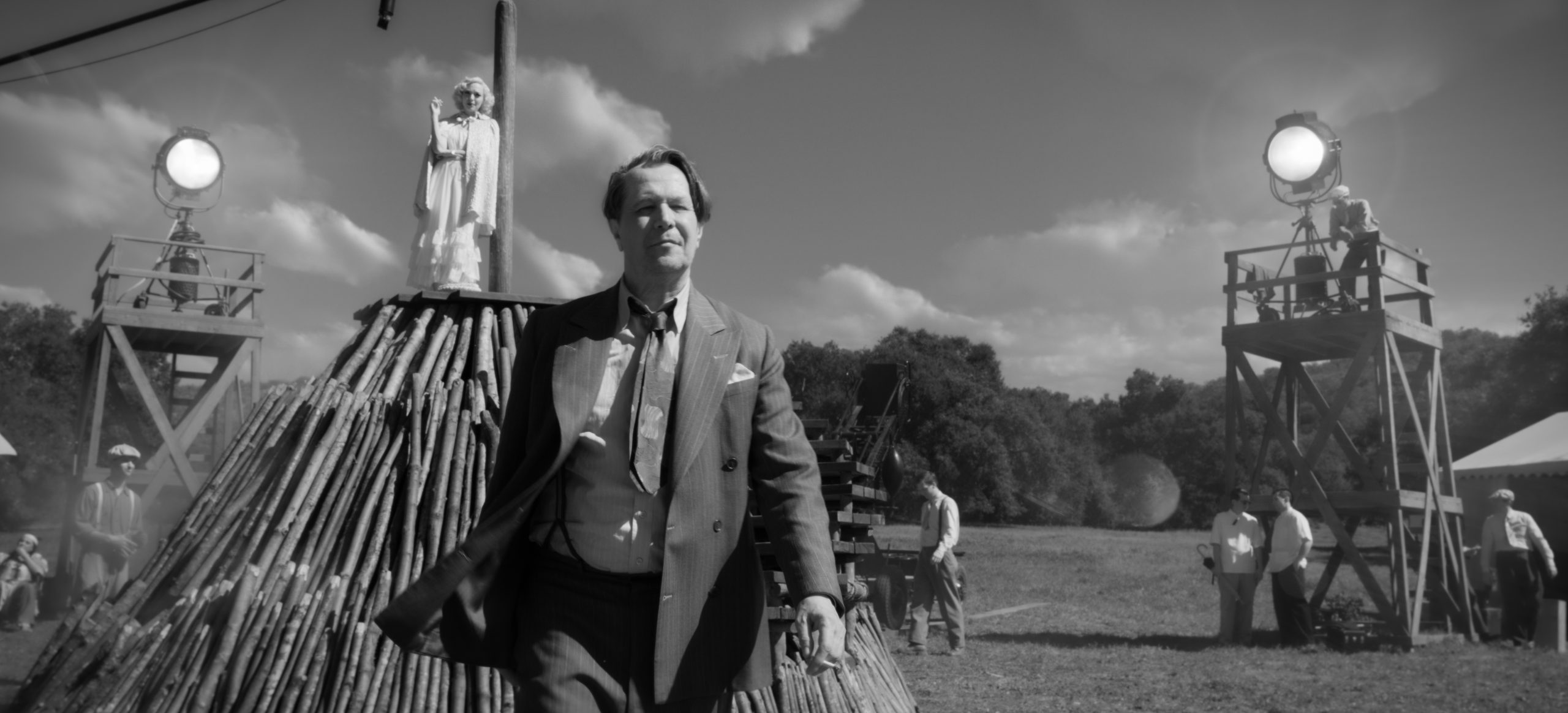
David Fincher‘s Mank is brilliantly summarized by its titular character when he says “You cannot capture a man’s entire life in two hours. All you can hope is to leave an impression of one.” Sadly, the impression Netflix’s Oscar-hopeful leaves is not a very lasting one, but a surface-level, distant hint of something deeper.
It is easy to assume that your enjoyment of Mank will vary depending on your familiarity and/or interest in Citizen Kane and the Hollywood of the 1930s. The film follows Gary Oldman as Herman J. Mankiewicz, the titular Mank, a screenwriter genius whose affection for alcohol and inability to keep his mouth shut when it matters causes him to burn all bridges with the industry and also write one of the best films of all time – Citizen Kane. Much in the same style as Citizen Kane, Fincher’s Mank is told non-linearly, framed around the summer of 1940 when Mank wrote the screenplay for Citizen Kane and flashbacks to Mank’s fall from grace in Hollywood, and his involvement with newspaper tycoon William Randolph Hearst’s (Charles Dance) inner circle.

NETFLIX
Those in the audience with an interest in Turner Classic Movies or the You Must Remember This podcast will have a blast catching all the references and easter eggs, as well as trying to recognize all the writers, producers, executives, and other Hollywood players that the film doesn’t bother giving last names to. Likewise, Fincher and his team go to painstaking lengths to recreate the feeling of a ’40s film, making this one of the most visually impressive films of the year. Shot beautifully in black and white by Mindhunter cinematographer Erik Messerschmidt, the film at times captures the feeling of celluloid, even replicating the movie cue marks on the upper right corner of the frame. The booming sound and crackly dialogue also make this feel like it was shot 70 years ago, while Trent Reznor and Atticus Ross deliver one of their most experimental and remarkable scores yet, with music that you’d find in a screwball comedy that nevertheless packs a lot of tension.
But this also points at the film’s biggest problem — that it keeps the audience at arm’s length. Despite being supposedly a movie about Mank and how he wrote Citizen Kane, the film spends surprisingly little time exploring his relationship with filmmaker Orson Welles or showing Hearst’s relentless attempts at preventing anyone from seeing the finished film. Instead, the film is more about Mank growing disillusioned with a conservative Hollywood where a few men in power affect and hide the work of individuals in order to serve their own purposes. Most of the film is devoted to the 1934 California gubernatorial election, and a campaign led by rich and powerful Hollywood executives and studio owners to affect the election. Even if this, unfortunately, rings very true to 2020, the film never gives us any reason to care about the election, especially because for most of the film Mank doesn’t give it a second thought.

NETFLIX
This is extended to the film’s narrative style. In the film, the script for Citizen Kane is described as “so scattered, the audience will need a road map,” referring to its non-linear structure. Later in the film, those same critics sing the script’s praises and call its non-linear structure revolutionary. Fincher himself wants to achieve the same thing with Mank, confusing its audience a little in the beginning before it all connects at the end. The problem is that there is never a moment that makes everything click, and the audience’s connection to Mank is never as emotional as Citizen Kane’s connection to its titular character.
The film seemingly expects the audience to fill in the blanks of what it lacks emotionally with knowledge of the real story, and nowhere is this more evident than in the casting of Gary Oldman. Though the actor is phenomenal in capturing the poignancy and alcoholism of Mankiewicz, seeing a 62-year-old actor playing a man through his early 30s and into his 40s is jarring. Are we meant to take it as a representation of Mank having an old soul or the destructiveness of his drinking, the film never makes it clear. Worse yet, the film tries to paint a picture of a young Mank being disillusioned by a ruthless industry led by old men, but when Oldman is roughly the same age as them, it loses much of its emotional punch.
Ultimately, Mank is a film about legacy and just how individuals are so easily lost in the grander machinery of Hollywood. The film, much like David Robert Mitchell’s Under the Silver Lake, admires the creative legacy of Hollywood while nauseating at the ugliness beneath the glamour. Like Mank, who died seeing his contribution to Citizen Kane put into question for decades, the film shows plenty of other cogs in the Hollywood machine struggle to make their voices heard in the face of committees and dinner parties for the rich and powerful that hold the fate of thousands in their hands. It’s unfortunate, then, that the film tries to cover so many topics that it forgets to leave a lasting impression about the man that gave the film its title.



